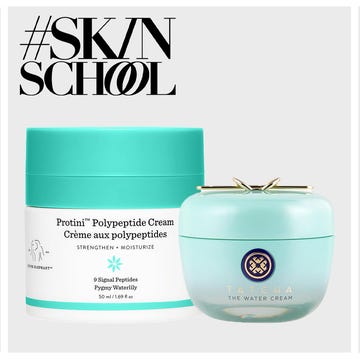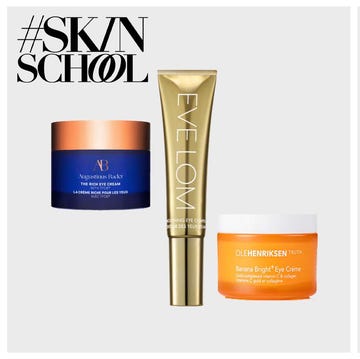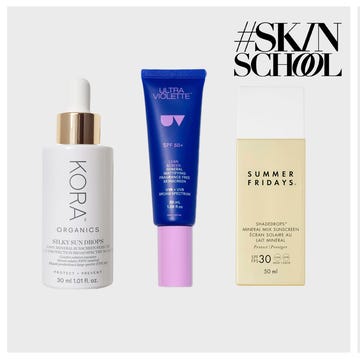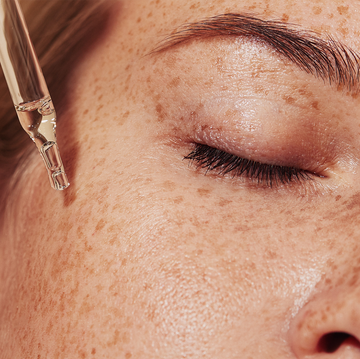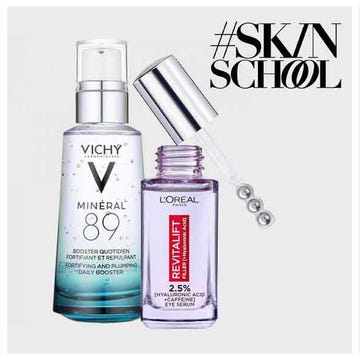We earn a commission for products purchased through some links in this article.
#SkinSchool: The best peptide serums and moisturisers, and how they work
The must-try skincare ingredient for a healthier, happier complexion
Peptides are the rising star of the skincare sphere. Previously outshone by hyaluronic acid, retinol and vitamin C, the buzzy ingredient is finally getting the recognition it deserves – cropping up in the latest serums, moisturisers and even supplements.
Not exactly new, the power of peptides has been known for some time. “The original research began in the Seventies and Eighties,” says Daniel Isaacs, formulator and development director at Medik8. Studies found that copper peptides can stimulate wound healing, helping patients post-surgery. “It wasn’t until the late Nineties that companies like Neutrogena began introducing copper peptides into their skincare products.”
Since then, advancements in delivery methods (how peptides enter the skin) have led to better absorption and ultimately, a resurgence of interest around this anti-ageing superstar. Here, we break down the pros of peptides and where to find the most efficacious formulas.
Best peptide formulas
What are peptides?
“Peptides are short chains of amino acids that act as the building blocks for proteins, including collagen and elastin,” explains Isaacs. These proteins contribute to the body’s cellular functions and are responsible for the skin’s natural resilience and strength. “Peptides and proteins are both produced naturally by the body,” adds Isaacs, but as we age, this production process slows down.
How do peptides work?
“Peptides act like messengers,” says skin specialist Sarah Chapman. “They trigger skin cells to do a specific function for a particular benefit.” Mainly, peptides boost collagen and elastin production in order to “firm the skin, support its structure, smooth wrinkles and much more,” adds Isaacs.
Are all peptides equal?
“There are many different types of peptides with a variety of different effects,” explains Chapman. Not all equal, “some stop your muscles contracting – a little like Botox – while others improve fluid drainage or stimulate collagen production.” Overall, peptides can be categorised into four functions:
Signal peptides
“Otherwise known as 'cell communicators', signal peptides tell the skin to do something, for instance - boost collagen,” says Isaacs.
Carrier peptides
As their name suggests, these peptides carry trace elements (like copper) to areas of damage to help with wound healing.
Enzyme-inhibiting peptides
These press pause on the body’s natural breakdown of collagen that already exists in the skin. “Tyrosinase is one, helping prevent an overproduction of melanin,” explains Isaacs.
Neurotransmitter-inhibiting peptides
They block the messages between nerves and muscles to prevent the muscle contraction of expression lines.
Do peptides in skincare work?
“Peptides are quite large molecules,” says Chapman, “so it can be hard for them to penetrate the skin.” While this was a problem in the past, advancements in delivery methods mean peptides can now travel differently. “Drone delivery is one cutting-edge method,” says Chapman. “This is where peptides are engineered into a specific shape to connect with certain types of skin cells, where they’re most needed.”
Another pioneering method is something called a platinum delivery system. “In my Platinum Pep8 Stem Cell Serum, peptides have been fused with tiny, ultra-penetrative platinum particles that drag the peptides deeper into the skin, where they can be most effective.” Medik8 use a combination of drone delivery and encapsulated peptides.
How to use peptides correctly
While peptides are powerful on their own, the experts recommend combining them with other hero ingredients for best results. “Peptides play a really important role as a booster,” says Isaacs. “They don’t compete with other actives,” he continues, “rather, they come in and accelerate the results of your core routine.”
“If you’re looking to improve skin’s overall health and youthfulness, combine peptides with vitamin A,” recommends Chapman. “This power couple will help reveal a fresh, smooth, firmer complexion while normalising sebum production.” For anyone with sensitive skin who steers clear of vitamin A, Isaacs adds that peptides can be used instead of this traditional anti-ageing ingredient. “Reactions to peptides are very rare and their efficacy is not really diminished by other actives,” says Chapman.
Dr Stefanie Willians, a dermatologist and medical director of Eudelo Dermatology & Skin Wellbeing Clinic, agrees that peptides can be a viable alternative to vitamin A derivatives. "Peptides sync perfectly with your skin's natural renewal processes, and work their magic even better when applied at night," she says. "Specifically matrikine peptides (such as Matrixyl) are a popular retinoid alternative, as they are non-irritating and well tolerated even by the most sensitive skin types." Dr Williams adds that, although peptides don’t yet have as many studies behind them as vitamin A derivatives, the evidence of their growth-factor-like benefits is steadily growing.
Looking to add peptides into your skincare regimen? “They can be incorporated at every stage,” says Chapman, “from cleansing all the way through to moisturising.”
The best peptide products to try now
Products boasting this skin-savvy ingredient usually contain either natural or synthetic peptides. While the former are extracted from things like rice, soya or seaweed, the latter are entirely lab-produced. Both are effective and both are well tolerated by the skin.
Because of this, peptides can be found in eye creams as well as serums, moisturisers, face masks and cleansers. To find out if peptides play a starring role in a product, check the ingredient list to ensure it features high up. And, as Chapman suggests, look at the delivery system being used to ensure the peptides will be able to penetrate the skin.
To target a multitude of skincare concerns, the pros recommend combining peptide products with other skin staples like vitamin C and hyaluronic acid, to make these ingredients work harder. Alternatively, look for products that already combine a cocktail of ingredients.
The best peptide formulas, according to Bazaar
















